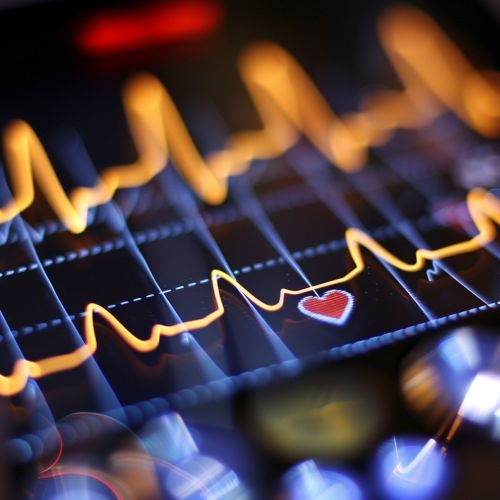Palpitations
Overview
Palpitations are the perceived abnormality of the heartbeat characterized by awareness of cardiac muscle contractions in the chest: hard, fast and/or irregular beats. It is a common occurrence and can be caused by various factors, including anxiety, stress, panic, fear, or intense physical activity. However, palpitations can also be a symptom of a more serious cardiovascular condition.


Causes
Palpitations can be caused by a wide variety of conditions and factors. These can be divided into cardiac and non-cardiac causes.
Cardiac Causes
Cardiac causes of palpitations include arrhythmias, which are abnormal heart rhythms. These can be further divided into supraventricular arrhythmias (originating above the ventricles) and ventricular arrhythmias (originating in the ventricles). Other cardiac causes include heart failure, heart valve disease, and myocardial infarction (heart attack).
Non-Cardiac Causes
Non-cardiac causes of palpitations include anxiety disorders, panic attacks, stress, and the use of stimulants such as caffeine or nicotine. Certain medications, such as those used for asthma, high blood pressure, or thyroid disease, can also cause palpitations. In some cases, palpitations may be caused by medical conditions such as thyroid disease or anemia.
Symptoms
While palpitations themselves are a symptom, they can be accompanied by other symptoms depending on the underlying cause. These may include dizziness, shortness of breath, chest pain, or fainting. If these symptoms occur, it is important to seek medical attention immediately.
Diagnosis
The diagnosis of palpitations involves a thorough medical history and physical examination. The doctor may ask about the frequency, duration, and nature of the palpitations. They may also inquire about any accompanying symptoms, triggers, or alleviating factors.
Diagnostic tests may include an electrocardiogram (ECG), which records the electrical activity of the heart, or a Holter monitor, which records the heart's activity over a 24-hour period. In some cases, an echocardiogram may be performed to visualize the heart's structure and function.
Treatment
The treatment of palpitations depends on the underlying cause. If the palpitations are caused by an arrhythmia, treatment may involve medications, a procedure known as cardiac ablation, or the implantation of a pacemaker or implantable cardioverter-defibrillator (ICD). If the palpitations are due to anxiety or panic, treatment may involve psychotherapy or medications to manage the anxiety.
Prevention
Prevention of palpitations involves managing the underlying cause. This may involve lifestyle changes such as reducing stress, avoiding stimulants, and maintaining a healthy diet and exercise routine. Regular medical check-ups are also important to monitor any underlying conditions that may cause palpitations.
